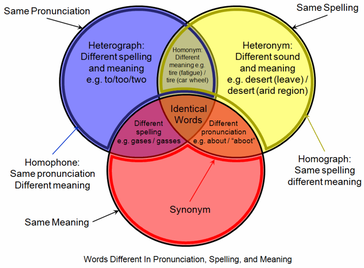Neither. A Homophone is a word that is pronounced the same (in varying degree) as another word but differs in meaning and often in spelling.
Homophones run in family herds with other similar relatives, the heteronyms [words with the same spelling but different pronunciation and meanings] and heterographs [words with the same pronunciation but a different spelling and meaning]. Whew!
The grammatical relationships in this family is more than this writer wants to deal with, but they stalk me and once and while break into my novels and cause problems for me.
Source: Wicki https://commons.wikimedia.org/w/index.php?curid=7146056

The duck test is a form of abductive reasoning or inference, the sort of logic that employs a set of observations to find the most likely explanation of the observations. The test implies that a person can identify an unknown subject by observing that subject's habitual characteristics.
“If it looks like a duck, swims like a duck, and quacks like a duck, then it probably is a duck.”
I’ve applied that same test to some of my problem words. I can’t prove they are homophonic couples, but …. well, you’ll see.
Nauseous and Nauseated
I’m not sure what to call this situation. The words sound similar to a homophone, it's not a duck.
●nauseous = causing nausea, sickness
●nauseated = feeling sick
Even though both the words nauseous and nauseated are often used to mean “feeling unwell” “or “sick to the stomach”, grammar purists insist nauseous means “to cause nausea” (presumably in another person) while nauseated means “to feel sick”. Casually, it is probably OK to use both words to mean feeling ill. However, in more formal situations, use each word correctly. https://www.grammarly.com/blog/nauseated = vs = nauseous/
Radiate, Irradiate, Irradiated
This is a question of using the correct part of speech more than it is a homophone.
●irradiate = to throw rays of light upon; to illuminate; to brighten; to adorn with luster (Verb)
●radiate = to extend, send or spread out from a center like radii (Verb)
● irradiate = is illuminated; irradiated; made brilliant or splendid (Adjective)
● radiate= radiating from a center; having rays or parts diverging from a center; radiated (Adjective).
https://wikidiff.com/irradiate/radiate
● irradiated = past tense of irradiate
● Food irradiation = the process of exposing food and food packaging to ionizing radiation, such as gamma rays or x-rays, that can be transmitted without direct contact to the source of the energy (radiation) to free electrons from their atomic bonds (ionization) in the targeted food. Harmless to people and animals, it extends life of foods by destroying organisms responsible for spoilage, foodborne illnesses, and sprouting,
https://en.wikipedia.org/wiki/Food_irradiation
Nucleus, Nuclear, Nucular
This one is my pet peeve and drives me nuts when I watch the TV news.



● nuclei = Plural of nucleus. More than one nucleus. (Noun)\

1) of, relating to, or constituting a nucleus or core of something, such as the nuclear family.
2) of, or relating to, a process by which the nucleus (central part) of an atom is divided or joined to another nucleus, resulting in the release of energy; i.e. relating to the power produced when the central part of an atom is divided or joined to another one.

● nucular is not a word. Despite the commonly used pronunciation -- in particular, by every TV news commentator who has ever spoken on the tube since it was invented -- nucular is actually the colloquial
mispronunciation of the word nuclear.
Merriam-Webster Dictionary receives so many questions about this mispronunciation (nuclear vs. nucular) that the dictionary calls it out for special mention in their FAQ section. It reports "widespread use among educated speakers, including scientists, at least two United States presidents and one vice president."
TRICKY HOMOPHONES
Most people, and particularly writers, use homophones all the time and have no trouble with them. Most of us know the difference between ate and eight or bare and bear. Nonetheless, all of us blithely breeze by some of the more tricky ones and don’t even realize we’ve made a mistake.
Discreet and Discrete
Here is one from my first book. It is not even a tricky one, but I didn’t pick up on it and neither did my editors. Some of my readers did and kindly pointed it out to me. Yuck!
● discreet = on the down low, under the radar, careful, attempting to be unnoticed.
● discrete = individual or detached.
Both words come from the same ultimate source, the Latin “discrētus”, for separated or distinct, but discreet has taken its own advice and quietly gone its separate way. https://www.vocabulary.com/articles/chooseyourwords/discreet = discrete/
Carat, Karat, Caret, and Carrot
I see this misused, often in commercials and advertisements. I believe that the confusion has to do with the fact in the Queen's English (in the United Kingdom) Carat and Karat mean the same thing.


● caret = a proofreader's mark placed below the line to indicate a proposed insertion in a text.
● carrot = a vegetable
For shame if you are an author and are not familiar with this one.
● afterward = interchangeable with the words "after" and "later."
● afterwards = at a subsequent or later time and usually relates to events that occur relatively close together, typically one right after the other.
● Afterword = an epilogue or concluding section of a text, typically written by the author of a book, play, or other significant work. In the past, was referred to as the "author's notes." (Noun)
https://www.thoughtco.com/afterwards = and = afterword = 1689292
Note: the words forward and foreword are similar, being a verb (motion) and a noun (part of a book or written document).
Complacent and Complaisant
● complacent = satisfied with the status quo while unaware of a danger ahead; self-satisfied or unconcerned.
● complaisant = eager to please; marked by an inclination to please or oblige.
Roo, Roux, Rue, and Roué
Foreign words absorbed into common English create problems, one being that the letters are usually pronounced differently in the foreign language than they would be in English. Another of the other difficulties is that the meaning in the original language may be modified or completely changed once it becomes an English word.
My husband is Italian. I lived in Italy for a number of years, and we spoke Italian at home when we returned to live in the United States. I’m familiar firsthand with how foreign words lose their original meaning. In Rome in the 1960s, the Italian word scampi did not refer to a particular type of shrimp or method of preparation. It meant shrimp. The Shrimp Scampi on the restaurant menu only means you are ordering shrimp shrimp fixed however the cook prepares it.
Similarly, gelato in Italian means ice cream, but Italian ice cream does taste differently. I haven’t been in Italy for six years, but based on Italian television, which we watch nightly, if you order gelato or ice cream, you will get the same thing.

● roux = a mixture of a fat, such as butter, and flour, that is used to make a sauce or a gravy. The term roux is derived from the French culinary term beurre roux, which means browned butter.

● rue = to regret something, to wish one may undo something, carrying a connotation of bitterness; regret. (transitive verb, which is a verb that takes an object.)
● roué = a debauched man, usually an elderly debauched man.
Eminent, Imminent and Immanent
Most of the homophones that give me problems involve three words, and often one of them I am unfamiliar with.

● immanent = dwelling within; inherent to something else; spiritual presence
The less common word, immanent, often sneaks in where it doesn't belong. Immanent comes from the Latin immanens for "to remain in." or “dwell within.” Often used in reference to spiritual or nonmaterial
things.


● mete = dispense or allot justice, a punishment, or harsh treatment (verb).
MORE COMMON HOMOPHONES
Aural, Oral, and Verbal
● aural = related to hearing or the sense of hearing (adjective);
● oral = something spoken rather than written; something related to the mouth.
● verbal = verbal can be spoken or written.
Oral and verbal both relate to something expressed through words, but oral is spoken and verbal can be spoken or written. These words are often used interchangeably since both describe spoken words but, in fact, they are not always interchangeable. If your little sister sticks everything in her mouth, she has an oral fixation. If she can recite the Constitution by age two, she's quite verbal.
Capital and Capitol
● capital =
1) of chief importance or influence, most serious (adjective);
2) the seat of government of a particular jurisdiction(noun) Example: Sacramento is the capital of California.;
3) letters conforming to the series A, B, C, D, etc. rather than a,b,c,d, etc. ▼

● principal
1) first in order of importance(adjective); Synonyms: main, primary, chief, foremost, most important, leading, dominant;
2) the person with the highest authority or most important position in an organization, institution, or group; such as the principal such as the principal of a school (noun); Synonyms: chief, chief executive officer, chairperson, president, director, etc.
3) in money, denoting an original sum invested or lent (noun) such as the principal sum of an
investment;
● principle = generally refers to a natural, moral, legal rule or standard (always a noun).
The word principle is used in a number of popular sayings, such as “In principle, I agree,” “As a matter of principle, I must take a stand.”
One dictionary give this tip for remembering the difference: Someone who is a “princi-P-A-L” should be looked at as your “pal.” Only people can be “pals” and principal refers to people, whereas “princi-P-L-E” refers to truths, rules, or standards. A truth or standard cannot be your “pal.”
Prophesy and Prophecy
Here it’s a matter of which is the correct part of speech to use.
● prophesy = say that a specified thing will happen in the future (verb) (Synonyms: foretell, foresee, divine, etc.)
● prophecy = a prediction (noun) (Synonyms: second sight, clairvoyance, prognostication divination, foretelling.)
Eye, I, Aye, and Aye-aye
Following up on my thought to add a list of Homophones to my website references, I ran onto a variation on this one that I had never heard of or seen. I had to add it.
● eye = the part or organ of a boy used to see (noun).
● I = A first person singular subject pronoun. (Always capitalized)
● aye = an old fashioned and nautical term for “yes”
And here is the one I learned.
● Aye-aye = The Aye-aye is a rare species of lemur native to isolated regions of Madagascar and known as the world's largest nocturnal primate. They are also one of the most distinctive looking animals on the planet due to a number of unique adaptations, including coarse dark hair, long bushy tails, rodent-like teeth, piercing eyes and skeletal hands that feature extra-long middle fingers with hooked claws. Aye-ayes are born weighing just a few ounces and reach up to 5 lbs. as adults. They have been known to live up to about 20 years.
There are zillions more homophones, but most of them we all know and love, and have mastered. It never hurts, though, to look up uses and pronunciations that sound a little off. English is constantly losing words and absorbing new ones, particularly foreign and technological words. I am planning to put a list of homophones on a reference page on my website … but it may take me a while.
□
Sources:
http://www.magickeys.com/books/riddles/words.html
https://en.wikipedia.org/wiki/Homograph#/media/File:Homograph_homophone_venn_diagram.png
en.wikipedia.org/wiki/Homograph
https://www.ragan.com/27 = tricky = homophones/
https://www.vocabulary.com/articles/chooseyourwords/discreet = discrete/
https://www.thoughtco.com/afterwards = and = afterword = 1689292








 RSS Feed
RSS Feed